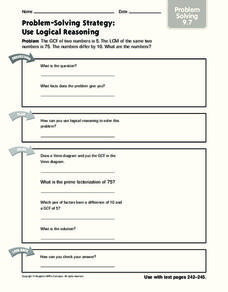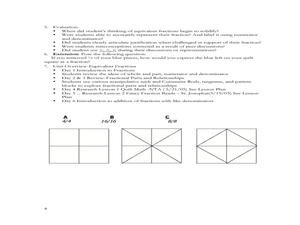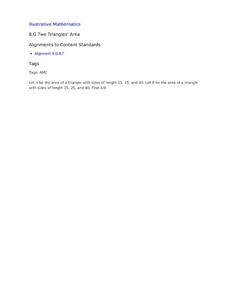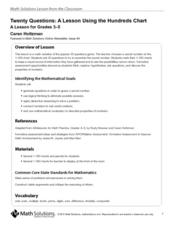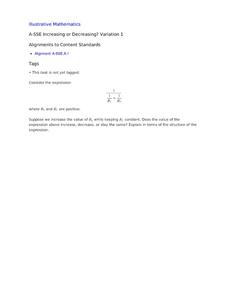Curated OER
Problem-Solving Strategy: Use Logical Reasoning
In this problem-solving activity, students solve 1 mathematical word problem by figuring out the answers to 7 questions. Students record their answers on the lines provided.
Curated OER
Two Squares are Equal
This problem is sure to get your young mathematicians thinking. The idea sounds simple: one equation, solve it as many ways as you can. This is meant to get at a deeper understanding of solving quadratic equations, including some more...
Curated OER
Half Math Quilt
Help your third graders become familiar with equivalent fractions for one-half by having them create a quilt. They will use triangles to create a quilt of equivalent fractions over a period of 6 days. As they create the quilt pieces they...
Curated OER
Two Triangles' Area
Need an activity for teaching the Pythagorean Theorem? Geometry juniors apply the Pythagorean theorem to two triangles to determine a final calculation.
Math Stars
Math Stars: a Problem-Solving Newsletter Grade 7
Put on your thinking caps because middle school math has never been more interesting in this huge resource full of thought provoking questions. Written as a newsletter, the resource has 10 two-page newsletters with a variety of...
Curated OER
Investigation-Mathematical Reasoning: Tables and Chairs
Fourth graders design a table and chair arrangement. In this mathematical reasoning lesson, 4th graders place tables shaped like equilateral triangles so that they seat the appropriate number of guests.
Illustrative Mathematics
Fishing Adventures 1
Often inequalities exist in many real-world contexts but young math learners struggle with understanding how to represent that relationship in a simple equation using an inequality. This activity focuses on the basic concepts by using...
Inside Mathematics
Two Solutions
Many problems in life have more than one possible solution, and the same is true for advanced mathematics. Scholars solve seven problems that all have at least two solutions. Then three higher-level thinking questions challenge them to...
EngageNY
Relationships Between Quantities and Reasoning with Equations and Their Graphs
Graphing all kinds of situations in one and two variables is the focus of this detailed unit of daily lessons, teaching notes, and assessments. Learners start with piece-wise functions and work their way through setting up and solving...
EngageNY
Relationships Between Two Numerical Variables
Working in small groups and in pairs, classmates build an understanding of what types of relationships can be used to model individual scatter plots. The nonlinear scatter plots in this lesson on relationships between two numerical...
EngageNY
Similarity and the Angle Bisector Theorem
Identifying and verifying reproducible patterns in mathematics is an essential skill. Mathematicians identify the relationship of sides when an angle is bisected in a triangle. Once the pupils determine the relationship, they prove it to...
Mathed Up!
Shading Fractions of Rectangles
Learners find the midpoint between two numbers, shade fractional amounts of rectangles as well as decimal amounts of rectangles, and explain their mathematical reasoning in words. The assessment is a great way to check for understanding...
Illustrative Mathematics
Kimi and Jordan
A single activity gets your math class to solve a word problem using two linear equations and two variables. They compare the summer earnings of Kimi and Jordan and then graph the solutions to determine who will save the most money in a...
Illustrative Mathematics
Finding Areas of Polygons, Variation 1
An exercise in finding the area of polygons by decomposing into triangles and composing into rectangles is the focus of this resource. Make several copies of the worksheet for each participant. Ask learners to use colored pencils to...
Curated OER
Add It Up In Number Ville! Adding 2-Digit Numbers With and Without Regrouping
Students explore adding 2-digit numbers. For this math lesson, students identify 2-digit numbers and use base ten blocks to practice adding. Students use addition to break a code.
Mathematics Assessment Project
Solving Linear Equations in Two Variables
Solving problems about pen and paper with systems of equations ... or is it the other way around? In the instructional activity, learners first interpret expressions and use equations in two variables to solve problems about notebooks...
Curated OER
Twenty Questions: The Hundred Chart
Use the 20 Questions game to practice math vocabulary and number properties! Project a hundreds chart and hand one out to learners. Ideally, give them counters (beans would work well) to mark off the chart so you can play multiple times....
Mathematics Assessment Project
Middle School Mathematics Test 2
A 13-page test with two 40-minute sections covers multiple years of math content. It incorporates applied problems and mathematical analysis.
EngageNY
Mid-Module Assessment Task: Grade 8 Module 4
Determine what the class knows about linear equations. The three-question mid-module assessment is segment 15 in a 33-part series. The assessment includes writing and solving one-variable linear equations and graphing proportional...
Illustrative Mathematics
Art Class, Assessment Variation
Play with paint and decide the ratio to make different shades of green. When mixing paint colors, your painters should decide which ratios make the same shade and what is needed to mix other ratios for a different shade of green. This is...
Illustrative Mathematics
Reasoning about Multiplication
In critiquing someone else's theory, learners share insight into their own understanding of mathematical concepts. Fifth graders will explore the notion that products are always larger than their factors. While this statement is true the...
Curated OER
Increasing or Decreasing? Variation 1
Your algebra learners analyze the value of an algebraic expression to decide if it will increase, decrease, or stay the same when one variable is changed as the others stay constant. Their collaborative efforts culminate with a written...
EngageNY
Special Relationships Within Right Triangles—Dividing into Two Similar Sub-Triangles
Why are right triangles so special? Pupils begin their study of right triangles by examining similar right triangles. Verifying through proofs, scholars recognize the three similar right triangles formed by drawing the altitude. Once...
Education Development Center
Algebraic Habits of Mind
Math really is just one big puzzle waiting to be solved. Show learners that math can be intriguing and provide them with visually engaging problems and puzzles. The focus is on solving simple equations and looking at expressions.


